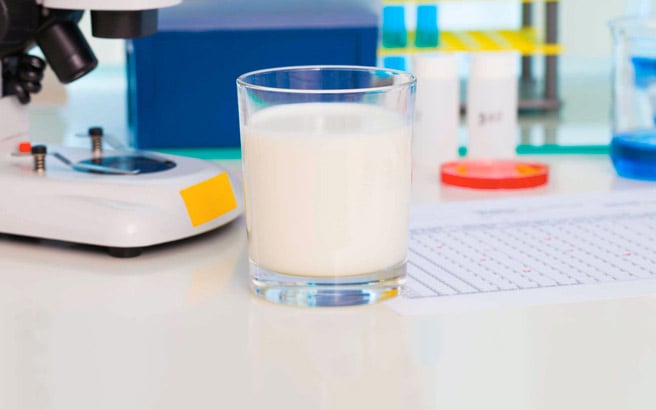 Dr Sarah Lewis is the principal investigator of our mechanisms research project at the University of Bristol and she has led several projects funded by our grant programme.
Dr Sarah Lewis is the principal investigator of our mechanisms research project at the University of Bristol and she has led several projects funded by our grant programme.
Many studies have suggested that drinking large amounts of milk may increase the risk of prostate cancer. However, these studies are prone to errors because it’s not always easy to accurately measure milk intake. It is also possible that other dietary or lifestyle factors that are different amongst men who consume large amounts of milk might be linked to prostate cancer, instead of milk itself.
To help us better understand the potential link between milk and prostate cancer, we explored the biological mechanisms that could explain this relationship.
The study
The aim of the study was to investigate the biological pathways by which a high milk intake may increase prostate cancer risk. We identified one potential mechanism for this link which is the insulin-like growth factor (IGF) pathway. IGF is a protein that interacts with cells, causing a cascade of chemical reactions in the cell that result in cell growth and multiplication. There are different types of IGF proteins that play different roles in this process.
We reviewed all available evidence linking milk or dairy intake to the IGF pathway and all evidence linking the IGF pathway to prostate cancer. We identified 172 studies, including trials (individuals were randomized to groups with varying milk intake), observational studies (individuals were asked to report on their milk intake), biomarker studies (levels of IGFs were measured in blood) and genetic studies.
We extracted data from all 172 studies and assessed how likely the results of the studies were to be biased. We then combined similar studies together to arrive at a conclusion for the effect of milk on each type of IGF, and for the effect of each type of IGF on prostate cancer risk or the likelihood of prostate cancer progressing to more advanced disease.
We found some evidence that the amount of a particular type of IGF (IGF-I) increases with milk intake.
There was also some evidence that prostate cancer risk increased with higher levels of the IGF-I protein. Genetic studies that took place supported these findings – that the higher our levels of IGF-1, the greater prostate cancer risk we have.
In summary, we found some evidence that parts of the IGF pathway may be stimulated by milk intake, and that IGF proteins circulating in the blood may affect prostate cancer risk.
Should men change their milk drinking habits?
Although we now know more about the link between milk and prostate than ever before, we still don’t have enough evidence to make a recommendation on consumption. We would like to see more research in this area in future, so we can continue to learn more about the link between the dairy products men eat and their prostate cancer risk.
Sarah’s work on the mechanisms behind a link between milk and prostate cancer is part of her wider work on a novel way to systematically review research on the mechanisms by which lifestyle factors affect cancer risk. This work will help us better understand the links between diet, nutrition, physical activity and cancer risk.
